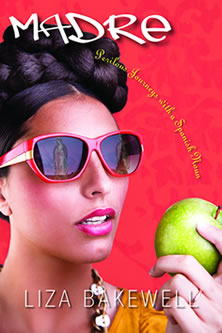Book Groups

"Thank you... for taking the time to meet with us and talk about your book and experiences."
— Zoilo Colmenares
"Liza, eres A toda madre!! ... You have friends in Arizona now!"
— Claudia Alvarez-Huffaker
"Your book made me think. Some of the most powerful Spanish words are female: la vida, la muerte, la paz, la guerra, la fe, la sabiduría, la mente, la esperenza, la gratitud, la calma, la pasion, la alegria, la risa, la compasión, la noblesa, la inteligencia, la soledad, la tristeza, la necesidad, etc."
— Mayra Betancourt Lerdahl, founder, Hola Spanish Meetup
"Liza, your book is DE POCA MADRE. Thanks for joining our group."
— Amarilis Gonzalez Alejandro
"Thanks for an insightful and fun evening!"
— Merlie Walters-Meis
"Liza, I had a wonderful time meeting you and being a part of the amazing discussion that took place at Ana Gloria's tonight. My only regret was not being able to stay longer! Best wishes!"
— Sisley Aragon Milroy
Polite women don’t say the word “madre” in Mexico, I was told time and again, while living in Mexico. So it was not easy to find translations for the expressions I had gathered over the years with madre in them.”
Book Groups
Madre is a wonderful book for book groups that are interested in reading:
Memoirs, Travel Literature, Spanish and Mexico, and How cultures shape language and how language in turn shapes us, our goals, our dreams and our children.
READING BOOK GUIDE
READING GROUP GUIDE (Download PDF)
1. While traveling in a foreign country, have you ever found yourself asking native speakers about certain expressions? Did any of those expressions turn out to be inappropriate, profane, sacred? What kinds of reactions did your questions provoke? How did you finally figure out the meanings?
2. Did this book give you a different impression of the word “mother?” Discuss other languages that include demeaning (or celebratory) mother expressions.
3. Can you think of examples in your native language or in another you have acquired where certain words or expressions are tied to very old histories? Can you think of words in English that might have religious origins?
4. Have you ever attended any rituals (weddings, birthdays, religious services, others) that were as sensory as the one Bakewell describes for a Mexican, Catholic wedding? How did words figure into those rituals? Did they take on more meaning for you because of the context (for example, “I do”).
5. The word “madre” conjures deep emotions. Can you think of words in your own life that conjure deep emotions? Do you know why or how they have this effect? Does it matter who says the word, when, where and why?
6. Have you ever considered the use of grammatical genders in Romance Languages like Spanish, French, Italian, or Portuguese? Do you agree with Bakewell’s argument that the masculine gendering of the words sex, love, pregnancy, childbirth, and birth may not be arbitrary? Have you ever wondered about where the women go, grammatically, when one man enters the room?
7. Bakewell draws upon the research of scientists who argue that not only does a culture influence a language, but languages can influence cultures and an individual’s perception of reality. For example, Germans think of bridges as feminine, while Spanish speakers consider them masculine (the word for “bridge” in German is in the feminine, in Spanish in the masculine). What do these findings imply for the impact of language on our psyche? What do they imply for the word “mother” and its numerous applications in Mexican Spanish?
8. When you sound out “mmmmmmm,” what do you feel? Are there other sounds that make you feel a certain way? Good, relaxed, excited, tense, at ease?
9. Consider Armando’s role in the book? What do you think of his relationship to his parents? What does this relationship tell the reader about the word “madre,” the word “padre”? Do you know anyone whose story reminds you of Armando’s?
10. Bakewell argues that the State and the Church are largely responsible for the many meanings and uses of “madre” in Mexico. Do you know of any institutions, large or small, in your own country’s history that have helped shape the meaning of English words?
11. How might Madre have been different if you had told the story, if a male linguist had told it, if a Mexican man or a Mexican woman had narrated it? What insights and/or subjects might have been left out or added?